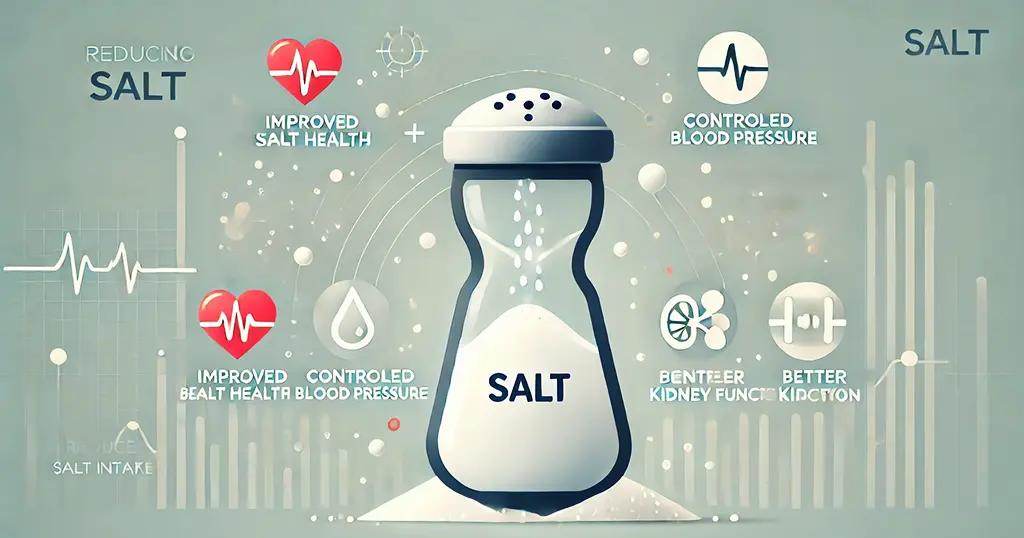Salt is present in almost everything we eat, and without it, our food doesn’t taste good. Salt has become an essential part of our diet. However, consuming too much salt can be harmful to your health. So today, we’ll explore what happens to your body when you reduce your salt intake.
1. Blood Pressure Gets Controlled
If you are suffering from high blood pressure or hypertension, reducing salt intake is essential. Excess salt tightens your blood vessels, which increases blood pressure. When you lower your salt consumption, your blood pressure gradually starts to normalize, and the load on your heart decreases.
A study conducted by the American Heart Association showed that low-sodium diets are beneficial for individuals at risk of hypertension. According to this study, research conducted on over 1,000 people found that reducing salt intake to 5 grams per day significantly decreases systolic blood pressure.
2. Reduces the Risk of Heart Diseases
Along with raising blood pressure, excessive salt consumption increases the risk of heart diseases. By reducing salt intake, you can significantly lower the risk of heart attacks, strokes, and other cardiovascular diseases. It acts as a preventive measure for heart health.
A 2013 study published in the BMJ proved that reducing salt intake led to a 20% reduction in heart disease and stroke cases. This study suggested that if sodium intake is reduced worldwide, there could be a dramatic reduction in heart disease cases.
3. Reduces Puffiness and Water Retention
Excessive salt leads to water retention in the body, which can cause puffiness in the face and body. When you reduce salt in your diet, the excess water in the body gets flushed out, making you feel lighter and less bloated.
A study published in the Journal of Human Hypertension found that low-salt diets directly reduce water retention in the body. This is especially beneficial for people who experience puffiness and bloating due to high sodium intake.
4. Improves Kidney Health
Excessive salt consumption also negatively impacts your kidneys. Your kidneys have to work harder to remove the extra sodium from your body. By reducing salt intake, you lessen the stress on your kidneys, allowing them to function better.
A review from Harvard Medical School showed that excessive sodium intake can lead to chronic kidney disease (CKD). Low-sodium diets are recommended to improve kidney function, especially for those at risk of kidney disease.
5. Enhances Bone Health
Excess salt causes calcium loss from the bones, which can lead to osteoporosis or bone weakness. By reducing salt intake, you can keep your bones strong and healthy, which is especially important for those in the aging phase.
Research published in the Journal of Bone and Mineral Research revealed that excessive salt consumption increases calcium excretion from the bones, leading to decreased bone density. Reducing salt intake enhances calcium retention, lowering the risk of osteoporosis.
6. Aids in Weight Loss
If you are trying to lose weight, reducing salt intake can be a helpful strategy. Excess salt increases water retention, slowing down weight loss. By reducing salt, your body’s water balance improves, leading to better weight loss results.
A study published in The New England Journal of Medicine reported that individuals on low-salt diets experienced noticeable differences in body weight, particularly in terms of water weight loss. The main factor is the body’s fluid balance, which is directly affected by salt intake.
Conclusion
If you want to improve your overall health, reducing salt intake can be a smart decision. It is beneficial for your heart, kidneys, bones, and even your weight. By keeping salt levels low in your diet, you can achieve your health goals.
FAQs:
How much salt should be consumed in a day?
You should consume less than approximately 5 grams of salt per day.
What are the benefits of a low-sodium diet?
A low-sodium diet helps improve your heart and kidney health, and it also helps control blood pressure.
Should everyone reduce their salt intake?
Yes, even healthy individuals should keep their salt consumption limited.
if you want to check more post like this, please visit : Infoblog BHARAT

Once again good information
Good
Exilent 👏👍
Nice pics and videos 📸